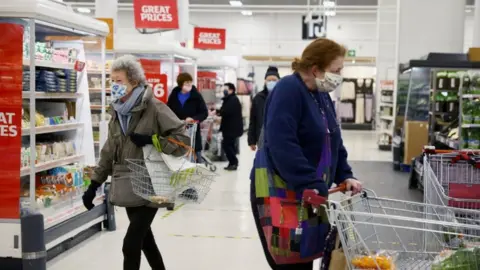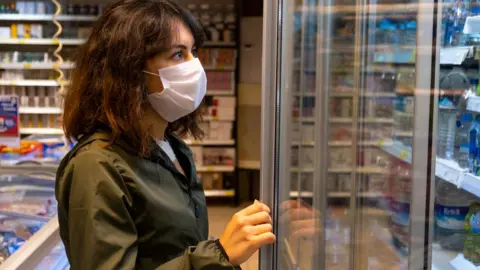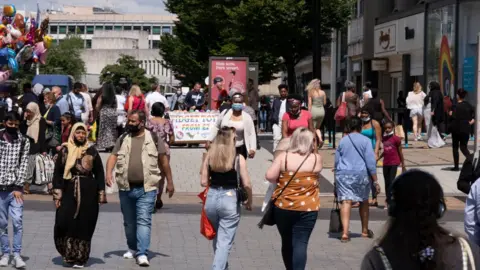Sainsbury's and Tesco to encourage mask-wearing from Monday
 Reuters
ReutersThe UK's two largest supermarkets will continue to ask shoppers to wear masks, even after the legal requirement to do so in England is dropped on Monday.
Sainsbury's and Tesco have joined the bookseller, Waterstones, which has said customers should wear masks to protect staff and other shoppers.
Sainsbury's said signs and tannoy announcements would remind shoppers to cover their faces.
Tesco said it wanted to "be on the safe side".
The chain will also continue to limit the number of shoppers in store at any one time.
The government has said it "expects and recommends" shoppers in England to wear face masks from Monday. But the legal requirement to cover your face in enclosed spaces will end. Different rules apply in the devolved nations.
The new guidance leaves firms to decide their own safety policies after 19 July when Covid rules are lifted.
Along with Tesco, Sainsbury's and Waterstones, several other businesses and organisations have said they will ask customers to keep their masks. They include:
- Asda, which will continue to offer masks to its customers
- John Lewis, including its Waitrose grocery chain
- Aldi and Lidl supermarkets
- Ryanair and easyJet, along with several other airlines and holiday firms
- London Underground and other regional transport services.
The decision poses a dilemma for businesses, however, since it is not clear whether encouraging mask-wearing will put off or attract shoppers.
Primark has said it won't have signage requesting customers to wear masks but hopes they will continue to do so. John Timpson, founder of the keycutting and shoe repair chain, said the decision would be left to customers.
Sainsbury's said its strategy reflected feedback from customers and colleagues, with the majority of those surveyed in favour of keeping the mask policy in place.
The chain said some Covid measures, such as screens between self-service checkouts and checkout queues, would be gradually removed. However screens between checkout staff and customers will remain in place.
The recommendation to wear a mask is based on scientists' advice that it will help prevent the wearer from infecting others through the wider dispersal of airborne particles.
Critics of the government's new strategy say, given the current rapid spread of the virus, rules on mask-wearing should be retained after other social restrictions are eased in England on 19 July. Scotland, Wales and Northern Ireland are maintaining stricter rules on face-coverings.
The trades union body, the TUC, called the government's strategy in England "a recipe for rising infections".
The shop workers' union, Usdaw, said the policy would create confusion and put shop workers at risk.
 Getty Images
Getty ImagesIn its advice, the government says: "Face coverings are no longer required by law. However, the government expects and recommends that people continue to wear a face covering in crowded, enclosed spaces."
It said this would apply to offices, factories, shops, construction sites, and close-contact services such as hairdressers and beauticians.
The government said it expected any return to work to be "gradual" and asked employers to continue to use measures to reduce potential Covid spread, such as risk assessments, thorough cleaning and ensuring adequate ventilation.
However, much of the language in the guidance involves "encouraging" employers, staff and customers to "consider" measures which are already widespread, such as hand-washing, sanitiser use and contactless payments.
The TUC's general secretary, Frances O'Grady, said the guidelines "have been published without proper consultation with unions or employers, just two full working days before restrictions end on Monday".
"Instead of providing clear and consistent guidance on how to keep staff safe at work, the government is abandoning workers and employers," she said.
Employers body the Institute of Directors said the guidance "fails to inspire confidence in the return to work".
Dr Roger Barker, policy director at the Institute of Directors, said: "Like everybody else, businesses across the country having been awaiting 'freedom day' with bated breath.
"But instead we have had a series of mixed messages and patchwork requirements from government that have dampened that enthusiasm."
 Getty Images
Getty ImagesThe British Retail Consortium, which represents big chains, said violence and abuse against shop workers had been on the rise during the pandemic, adding that "colleagues cannot be put in the firing line because of this change in policy".
Chief executive of the trade body Helen Dickinson said retailers will be asking customers to be "considerate to those around them" when choosing whether to wear a face covering.
The beauty industry trade body Babtac said that they will be working with members to provide more clarity.
Head of Babtac, Lesley Blair, told the BBC that while it may no longer be law, the group "would certainly encourage" their members to continue to wear masks for the time being, especially when working in close proximity to customers.
